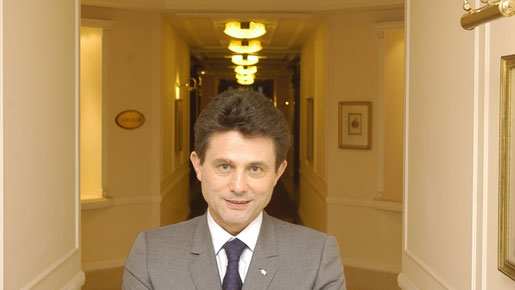
In France there is a widely reported rumour that in 2007 Henri de Castries was invited to join the government as the French finance minister. An approach of that nature would hardly be surprising for a man who has service to government and country in his blood. Henri Rene Marie Augustin de la Croix de Castries comes from a long line of notable people, including a naval minister who served under King Louis XVI, the commander of French forces at Dien Bien Phu, and a hero of the Free French during the second world war.
He spent his own military service in the paratroopers, but decided against following the family tradition of a military career, opting instead to study business and law at university. He then attended the École Nationale d’Administration (ENA), France’s school for the civil service, graduating at the top of a class that included several of the country’s senior politicians.
His career with the civil service lasted just nine years, during which his work brought him into close contact with the commercial world. Starting as a member of an internal auditing group in the Finance Ministry, he went on to the French Treasury where he monitored companies in financial difficulties, and ended up supervising the national balance of payments which involved him in several large privatisations.
A man of action, he clearly found the pace and bureaucracy of government operations frustrating. Following a chance meeting with Claude Bebear, CEO of French insurance giant, AXA, de Castries was persuaded to leave the government and join AXA in 1989. Bébéar was bent on building a world leader through a string of acquisitions, and after two years spent learning the business, de Castries earned respect and successive promotions through his work in restructuring and managing the growing organisation. He became Bébéar’s heir apparent, taking over as CEO in the year 2000.
New directions
When he stepped into the top job, there was an immediate shift in strategy at AXA, from an almost single-minded pursuit of M&A to a clear focus on consolidation and cost cutting. Both strategies were correct for their times, de Castries maintains. “In the 1990s equity markets doubled and interest rates fell,” he explains. “This created odd behaviour in the industry, which led to irrational and unsustainable business models. The genius of Claude Bébéar was to recognize the unreality of the 1990s and to build AXA using equity. He developed a unique platform and never overpaid for acquisitions.”
But the strategy could not be sustained, particularly following turmoil in the insurance industry caused by catastrophic losses and bear equity markets in the early part of the following decade. De Castries set about re-focussing the business by selling off some attractive but non-core assets, paring costs, producing more innovative products and beefing up his distribution network. As a result, AXA managed to nearly double its operating earnings during the downturn, when most of its rivals were posting record losses. “I think this [downturn] is what our industry needed,” he said. “It’s been a challenge, of course, but that is what a CEO gets paid for.”
His next goal is to triple the company’s 2004 profits by 2012, and there is little doubt in the industry that he can do it. His strategy is to operate in one very well defined business. “We choose our markets carefully and do only three things in those markets – life insurance, property and casualty, and asset management,” he has said. Sustainable growth will be achieved by amortising the costs of customer acquisition over a lifetime of insurance and wealth management products.
Using terms that perhaps echo his noble heritage, de Castries admits that managing a business with a total headcount of 214,000, including salaried staff and tied agents, can be a challenge. “If you want to manage well,” he says, “you need to get the right balance between feudalism, where there is a strong decentralisation of power, and control from the centre. If there is going to be decentralisation, then you need to have a high degree of transparency over goals and objectives and a way of constantly monitoring performance.”
At AXA, this is achieved by setting strict financial targets, in the form of nine key performance indicators, at management board level, but leaving local managers with a high degree of operating autonomy. “We talk through things thoroughly on the management board, but then we act,” says Christopher Condron, a member of the board. “By contrast, some of my peers who have joined European companies find the process and consensus orientation almost maddening.”
Throughout his career with AXA, de Castries has maintained his contacts in the government, some of whom call up for his advice on finance matters. If he has any passionate political belief of his own, it is that France must embrace globalisation. At a 2005 Goldman Sachs conference he argued that with domestic markets characterised by flat growth, high taxation and high public spending, French companies need to build strong international growth.
Under his guidance, AXA has been doing just that. In 2008, France accounted for 23 percent of the company’s global insurance revenues. The rest came from northern Europe (25 percent), North America (17 percent), the Mediterranean region (13 percent), Asia/Pacific (10 percent), and UK & Ireland (nine percent). With a surplus of nearly €7bn relative to the capital needed for the business, the company is also back on the acquisition trail. In announcing the company’s better-than-expected first quarter results this year, de Castries hinted at possible takeovers in central Europe and South America, increasing the number of countries AXA operates in beyond the current 55.
Asked about his decision to turn down the job at the finance ministry, de Castries commented, “I think I am serving my country by doing what I do at AXA as well as I would in a political position.” His old friends at the Treasury would probably agree.

